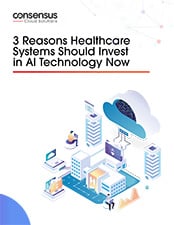Filters
Solution
Collateral Type
Care Setting
Topic
Product
Cutting Through the Hype: Deploying AI Now to Improve Patient Care
Cutting Through the Hype: Deploying AI Now to Improve Patient Care - Healthcare IT Today
The following is a guest article by Bevey Miner, Executive Vice President, Healthcare Strategy and Policy at Consensus Cloud Solutions
Artificial intelligence (AI) is everywhere, and with so much hype around it, healthcare organizations are rightfully cautious about deploying AI solutions.
Although promising in its ability to transform healthcare through more efficient and accurate data capture and management, there is still much that we as an industry and society need to understand before scaling its use, especially when it comes to patient care. During a recent panel discussion at HIMSS24 in Orlando, Fla., March 11–15, three panelists representing different types of healthcare technology shared their perspectives on the role of AI in healthcare and provided a real-world look at how, in a controlled setting, AI can be deployed and monitored to handle the complexity of care delivery.
Today, AI is at the heart of many technologies, and a large subset of it deals primarily with software that can imitate human behavior through functions like pattern recognition, and natural language processing — which encompasses generative AI, one of the more popular applications of AI today — and machine learning, according to panelist Jeffrey Sullivan, Chief Technology Officer at Consensus Cloud Solutions.
Clinical and Administrative Uses of AI
AI isn’t new to healthcare, but how we’re using it continues to evolve, according to another panelist, Madelaine Yue, Vice President of Solutions Delivery at Experis Health Solutions. For instance, we are capturing data in a more systematic way that can be used for machine learning in both clinical and administrative settings.
On the clinical side, this can include analyzing data from patients’ EHRs to provide decision support interventions, which is a term introduced by the U.S. Department of Health and Human Services Office of the National Coordinator for Health Information Technology in its recently released HTI-1 final rule to take into account how AI can inform clinical decisions. On the administrative side, AI can be used to automate manual processes, such as writing patient communications — which studies have found to be more empathetic than what clinicians draft — and consolidate information for “more efficient use of your human factor,” Yue said.


